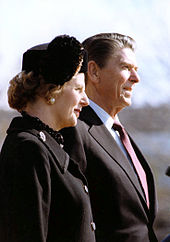- Conviction politics
-
Conviction politics refers to the practice of campaigning based on a politicians' own fundamental values or ideas, rather than attempting to represent an existing consensus or simply take positions that are popular in polls.
On the right, the term has been adopted by politicians like Margaret Thatcher, who declared "I am not a consensus politician. I am a conviction politician" upon assuming leadership of the Conservative Party in 1975.[1] On the left, it was vocally supported by Paul Wellstone, whose Wellstone Action now trains future politicians in his theory of conviction politics.
Contents
History
Thatcher, like her counterpart Ronald Reagan in the United States, argued that her leadership should be a time for big, bold changes, grounded in the central principles of her ideology. "It was not a set of policies cobbled together from minute to minute, begged, borrowed or stolen from other people," she said when describing her government. "It was successful because it was based on clear, firmly-held principles..."[2] A devout Methodist, she further defended these principles as being grounded in the Christian Bible: "I believe that by taking together these key elements from the Old and New Testaments, we gain a view of the universe, a proper attitude to work and principles to shape economic and social life. We are told we must work and use our talents to create wealth."[3]
Her thinking on the subject was influenced by Keith Joseph, sometimes considered the "intellectual leader"[4] of modern British conservatism and the man Thatcher called "my closest political friend."[5] Joseph had developed an intellectual critique of the reigning postwar and Keynesian consensus and criticized the "consensus politics" that continued to promote it.
In 2007, then-current British Prime Minister, Gordon Brown announced he too was "a conviction politician" after private talks with Lady Thatcher in a 10 Downing Street visit. He was criticised for the gaffe as being inappropriate for a Labour Party politician to identify with the 81-year-old former Conservative prime minister.[6]
In the US, Democratic Senator Paul Wellstone was a major proponent of conviction politics from the left, promoting peace, environmental and labor protections, and health care. After Wellstone's death in 2002, his longtime aide and campaign manager, Jeff Blodgett, founded Wellstone Action, which promotes conviction politics through education and training. Blodgett's book, Winning Your Election the Wellstone Way, strongly promotes conviction politics for progressive politicians.
Virginia congressman Tom Perriello explicitly ran his successful campaign based on "conviction politics" and hoped his example would encourage others to run conviction politics campaigns in the future.[7]
Theory
There are a number of arguments in favor of conviction politics. One is that it is more honest -- a conviction politician simply says what they believe rather than shading their opinions to be more palatable to their audience. Another is that by voicing strong opinions they push public debate forward and promote a genuine discussion of political issues. Even if a candidate loses, they will have promoted their particular political ideas and hopefully persuaded some voters of their value.
There are also more instrumental reasons. By arguing forcefully for their positions during the campaign, a politician is more able to pursue those goals once in office. Also, proponents argue that conviction politicians are more likely to win. When he was a candidate, Tom Perriello said that "More often, the deepest connection with another person comes from when I disagree with them and admit it, because at least they know I will tell the truth. While some strategists focus on positioning candidates on issue after issue, I believe most voters focus more on whether the candidate integrity and character on the whole, demonstrated by the conviction to take a stand."[7]
Paul Wellstone frequently heard voters tell him "I don't always agree with you, but I like it that I know where you stand." He found that when he announced his opposition to the 2003 invasion of Iraq, an unpopular position at the time, he jumped to a five-point lead in the polls.[8]
In the United States, 87% of voters say they think politicians are "pretty much willing to say whatever it takes in order to get themselves elected."[9] By saying what they believe and ignoring the polls, conviction politicians distinguish themselves from other politicians in this way.
Criticism
The conviction politics practiced by George W. Bush has been called a "hard ideology" with "religious and chauvinistic underpinnings" and "contributed to the call by Muslim fundamentalists to a broader jihad" – it has "redefined the war on terror and alienated Arab and Muslim public opinion."[10]
Critics of Margaret Thatcher's conviction politics say it "burst apart the old consensus"[11] and has "fostered dissensus".[12]
Some critics have gone farther and have said that conviction politics, especially in the US, are "theological politics".[12]
References
- ^ "A Tory Wind of Change". Time. 1979-05-14. http://www.time.com/time/magazine/article/0,9171,916773-6,00.html. Retrieved 2010-04-30.
- ^ Forrester, Duncan B. (2005). Theological Fragments: Explorations in Unsystematic Theology. Continuum International Publishing Group. pp. 169. ISBN 9780567030238. http://books.google.com/books?id=DkNm1s2d-coC&pg=PA169&dq=%22conviction+politics%22&as_brr=3&ei=5i8GScmoOZKUM4C36OoK&client=firefox-a.
- ^ "Margaret Thatcher: Christianity and Wealth". Modern History Sourcebook. http://www.fordham.edu/halsall/mod/1988thatcher.html. Retrieved 2008-11-05.
- ^ http://books.google.com/books?id=BDe9IiwPm4EC&pg=PA61&dq=%22conviction+politics%22&as_brr=3&ei=5i8GScmoOZKUM4C36OoK&client=firefox-a#PPA7,M1
- ^ http://www.pbs.org/wgbh/commandingheights/shared/minitextlo/prof_keithjoseph.html
- ^ "Brown welcomes Thatcher to No 10". BBC News. 13 September 2007. http://news.bbc.co.uk/1/hi/uk_politics/6993269.stm. Retrieved 2008-11-05.
- ^ a b http://tpmcafe.talkingpointsmemo.com/2007/10/29/conviction_politics_in_practic/
- ^ http://www.wellstone.org/about-us/wellstone-legacy/articles/populism-organization-and-conviction
- ^ Shorenstein Center Poll, March, 2000. USSHOREN.031300.R15
- ^ El-Ayouty, Yassin; Gerald J. Galgan, Francis J. Greene, Edward Wesley (2004). Perspectives on 9/11. Greenwood Publishing Group. pp. 118–120. ISBN 9780275979041. http://books.google.com/books?id=chbVzsdxVasC&pg=PA118&dq=%22conviction+politics%22&as_brr=3&ei=5i8GScmoOZKUM4C36OoK&client=firefox-a.
- ^ Evans, Eric J. (2004). Thatcher and Thatcherism. Routledge. pp. 61. ISBN 9780415270137. http://books.google.com/books?id=BDe9IiwPm4EC&pg=PA61&dq=%22conviction+politics%22&as_brr=3&ei=5i8GScmoOZKUM4C36OoK&client=firefox-a.
- ^ a b Harlow, Carol; Richard Rawlings (1992). Pressure Through Law. Routledge. pp. 291. ISBN 9780415015493. http://books.google.com/books?id=cp1yKS2CTXYC&pg=PA291&dq=%22conviction+politics%22&as_brr=3&ei=5i8GScmoOZKUM4C36OoK&client=firefox-a#PPA291,M1.
See also
Categories:- Political terms
- Political neologisms
- Margaret Thatcher
Wikimedia Foundation. 2010.

